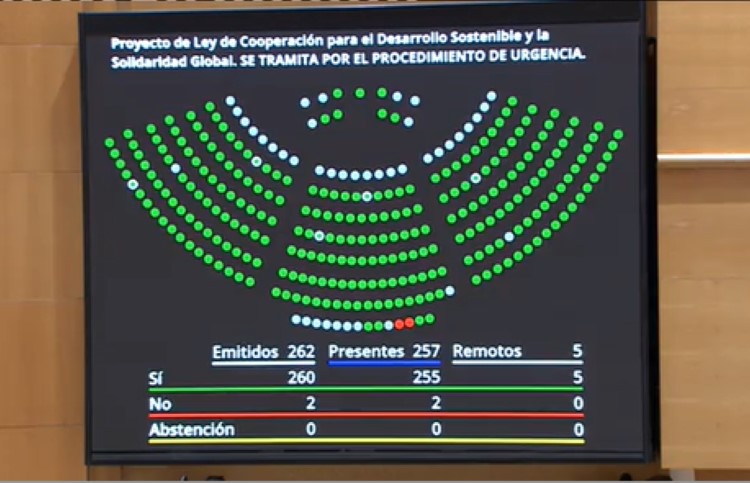The Diplomat
The plenary session of the Senate approved yesterday by a very large majority, although with modifications, the Bill of Cooperation for Sustainable Development and Global Solidarity, the penultimate step of the parliamentary process before its ratification and final approval by the King.
“Thanks to the 260 yeses in the Senate to the new Law on Cooperation for Sustainable Development, we are closer to its final approval,” declared the Minister of Foreign Affairs, José Manuel Albares, through his official Twitter account. It is, he continued, “a necessary, demanded and consensus law that will allow for greater effectiveness of our policies”.
The proposal was approved with 260 votes in favor, two against and no abstentions. Since the text has been approved with modifications, the initiative will have to return to the Congress of Deputies for a final debate in the plenary with the amendments adopted by the Senate. In the vote of the Lower House, held on November 24, the result was 201 votes in favor, 52 against and 94 abstentions.
The affirmative votes came in both Chambers from the PSOE and its partners and allies, and the negative votes from Vox (which had presented an amendment to the totality, widely rejected, against an “ideologized and senseless” law which attacked “national sovereignty”). On the other hand, the main difference in the two votes has come from the PP, which in Congress abstained (92 abstentions on its part) and in the Senate chose to vote in favor, after keeping secret what its vote would be in the Upper House until the very moment of the debate.
During his speech yesterday before the plenary, the PP spokesman in the Senate, Alberto Fabra, assured that his party would vote in favor of the law because development cooperation is a “State policy”, but strongly criticized the Government for the way it has negotiated the text, in comparison with the attitude of the Executive of José María Aznar (PP) during the process of approval of the current Law on International Cooperation of 1998.
On that occasion, he assured, the Government “knew how to listen to the sector, to the different actors, and negotiate the law with the PSOE and the rest of the groups”, while, in this case, the PSOE Government “has also listened to the sector and to the different actors, but has negotiated with other parliamentary groups and, in the end, with the PP”. “The order of the factors is very important,” he added. That PSOE of 1998 “had a sense of State”, while the current one is “the Spanish Obedient Sanchist Party, sitting in the State and not with a sense of State, that is why it is complicated to reach agreements”, he said.
For his part, José Manuel Albares assured yesterday before the plenary, just before the vote, that the Government has extended its hand “from the first minute” and, “until the last moment, it has made the effort to join” all the parliamentary groups to move the project forward, because “it is a law of all”. “It is not the law of the sanchist government, it is the law of the Government of Spain presided over by President Sanchez,” he warned. “Cooperation is a State policy and this was a State law and we had to make the effort to add everyone,” he said. Therefore, Albares thanked the PP for having “reconsidered its position” in favor of the Bill and thanked Fabra’s personal work to get his party to renounce abstention and finally opt for the yes.
The amendments and the text
The text approved yesterday includes six compromise amendments agreed between the different groups and other amendments of the PP to improve the wording, with modifications related to the multi-year indicative planning of the Master Plans, to the inclusion of a sixth vice-presidency in the High Council of Cooperation for Development, to be chaired by the Minister of Foreign Affairs, and to the General Law of Subsidies, among others. For this reason, the text will have to return to Congress to debate these amendments.
The new law, which the Government intends to bring forward this year (it has been processed under the urgent procedure precisely for that reason), updates the current Law on International Cooperation for Development of July 7, 1998, and its main objective is to modify the Spanish Cooperation system, It envisages the reform of the Spanish Agency for International Development Cooperation (AECID), the establishment of the new Cooperant Statute, the regulatory development of financial cooperation through a regulatory framework of subsidies to make the system “more efficient and agile” and the creation of new instruments to improve evaluation, monitoring and accountability.
It also provides for the creation of the Spanish Fund for Sustainable Development (FEDES), a financial cooperation instrument that will assume the functions of the Fund for the Promotion of Development (FONPRODE). Likewise, the future regulation would give “legal status to Spain’s commitment to allocate 0.7% of GNI to Official Development Assistance (ODA) by 2030”, according to the Government. Among the geographical priorities of Spanish Cooperation, the draft law includes the Sahel for the first time and maintains the traditional areas, including Latin America and the Caribbean. Likewise, aid will be reinforced in the event of unforeseen crises.






